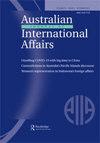从北京对澳大利亚的贸易破坏运动中吸取正确的政策教训
IF 1.8
3区 社会学
Q2 INTERNATIONAL RELATIONS
引用次数: 0
摘要
摘要:由于对中国的贸易暴露,人们认为主权受到威胁,因此呼吁澳大利亚政府接受“可信贸易”的概念。这涉及到利用政策杠杆推动贸易流向资本在地缘政治上与堪培拉更加一致的市场,并以“朋友支撑”供应链等形式得到实际表达。“可信贸易”倡导的一个主题是招募现有的以安全为导向的伙伴关系,包括澳新军团联盟、四方集团和五眼情报共享安排,以应对经济层面的问题。虽然这篇论文具有表面吸引力,但它详细说明了为什么走这条政策道路会从北京2020年5月开始的贸易破坏运动中吸取错误的教训,并使澳大利亚变得更穷、更不安全。强调了三个关键数据点,它们共同支持一种评估,即澳大利亚政府强调开放区域主义的传统贸易政策方法仍然非常符合目的。本文章由计算机程序翻译,如有差异,请以英文原文为准。
Learning the right policy lessons from Beijing’s campaign of trade disruption against Australia
ABSTRACT
Perceived threats to sovereignty stemming from trade exposure to China have led to calls for the Australian government to embrace the concept of ‘trusted trade’. This involves using policy levers to drive trade towards markets that have capitals more geopolitically aligned with Canberra and finds practical expression in forms such as ‘friend-shored’ supply chains. A theme of ‘trusted trade’ advocacy is the conscription of existing security-oriented partnerships, including the ANZUS alliance, the Quad grouping and the Five Eyes intelligence-sharing arrangement, to take on economic dimensions. While holding superficial appeal, this paper details why pursuing this policy path would be to learn the wrong lessons from Beijing’s campaign of trade disruption that began in May 2020, and make Australia both poorer and less secure. Three key data points are highlighted that collectively support an assessment that the Australian government’s traditional trade policy approach, emphasising open regionalism, remains overwhelmingly fit for purpose.
求助全文
通过发布文献求助,成功后即可免费获取论文全文。
去求助
来源期刊

Australian Journal of International Affairs
INTERNATIONAL RELATIONS-
CiteScore
3.20
自引率
13.30%
发文量
44
期刊介绍:
AJIA is the journal of the Australian Institute of International Affairs. The Institute was established in 1933 as an independent and non-political body and its purpose is to stimulate interest in and understanding of international affairs among its members and the general public. The aim of the Australian Journal of International Affairs is to publish high quality scholarly research on international political, social, economic and legal issues, especially (but not exclusively) within the Asia-Pacific region. The journal publishes research articles, refereed review essays and commentary and provocation pieces. ''Articles'' are traditional scholarly articles. ‘Review essays’ use newly published books as the basis to thematically examine current events in International Relations. The journal also publishes commentaries and provocations which are high quality and engaging pieces of commentary, opinion and provocation in a variety of styles. The Australian Journal of International Affairs aims to analyse international issues for an Australian readership and to present Australian perspectives to readers in other countries. While seeking to stimulate interest in and understanding of international affairs, the journal does not seek to promote any particular policies or approaches. All suitable manuscripts submitted are sent to two referees in a full ''double blind'' refereeing process.
 求助内容:
求助内容: 应助结果提醒方式:
应助结果提醒方式:


